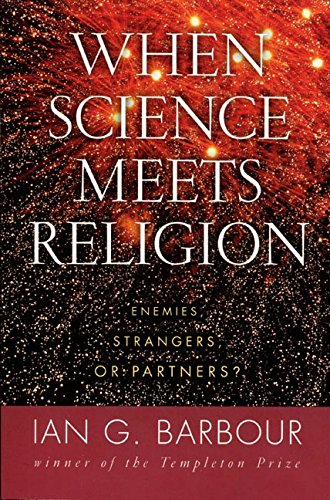When Science Meets Religion: Enemies, Strangers, or Partners?
The Definitive Introduction To The Relationship Between Religion And Science ∗ In The Beginning: Why Did the Big Bang Occur? ∗ Quantum Physics: A Challenge to Our Assumptions About Reality? ∗ Darwin And Genesis: Is Evolution God′s Way of Creating? ∗ Human Nature: Are We Determined by Our Genes? ∗ God And Nature: Can God
The Definitive Introduction To
The Relationship Between
Religion And Science
∗ In The Beginning: Why Did the Big Bang Occur?
∗ Quantum Physics: A Challenge to Our Assumptions About Reality?
∗ Darwin And Genesis: Is Evolution God′s Way of Creating?
∗ Human Nature: Are We Determined by Our Genes?
∗ God And Nature: Can God Act in a Law-Bound World?
Over the centuries and into the new millennium, scientists, theologians, and the general public have shared many questions about the implications of scientific discoveries for religious faith. Nuclear physicist and theologian Ian Barbour, winner of the 1999 Templeton Prize for Progress in Religion for his pioneering role in advancing the study of religion and science, presents a clear, contemporary introduction to the essential issues, ideas, and solutions in the relationship between religion and science. In simple, straightforward language, Barbour explores the fascinating topics that illuminate the critical encounter of the spiritual and quantitative dimensions of life.
We’re closing in on the 150th anniversary of Darwin’s Origin of Species, but clearly not closing in on any resolution of the debates that the book stirred up between science and religion. In this slim volume, physicist and theologian Ian Barbour summarizes his own decades-long accumulation of knowledge in these two arenas. Writing with clarity and a scientist’s eye for organization, Barbour takes on the scientific and theological significance of the big questions: the big bang, quantum physics, Darwin and Genesis, human nature (the question of determinism), and the relationship between a free God and a law-bound universe. In each chapter, Barbour recognizes four possible ways of responding to the dilemmas posed by these topics: conflict, represented by Biblical literalists and atheists, both of whom agree that a person cannot believe in both God and evolution; independence, which asserts that “science and religion are strangers who can coexist as long as they keep a safe distance from each other”; dialogue, which invites a conversation between the two fields; and integration, which moves beyond dialogue to explore ways in which the two fields can inform each other. Barbour notes that his own sympathies lie with dialogue and integration.
Barbour won the 1999 Templeton Prize for his role in advancing the study of science and religion. “No contemporary has made a more original, deep, and lasting contribution toward the needed integration of scientific and religious knowledge and values,” John Cobb has written of Barbour. This book is perhaps the best entry point into Barbour’s work. –Doug Thorpe
Product Features







Comments